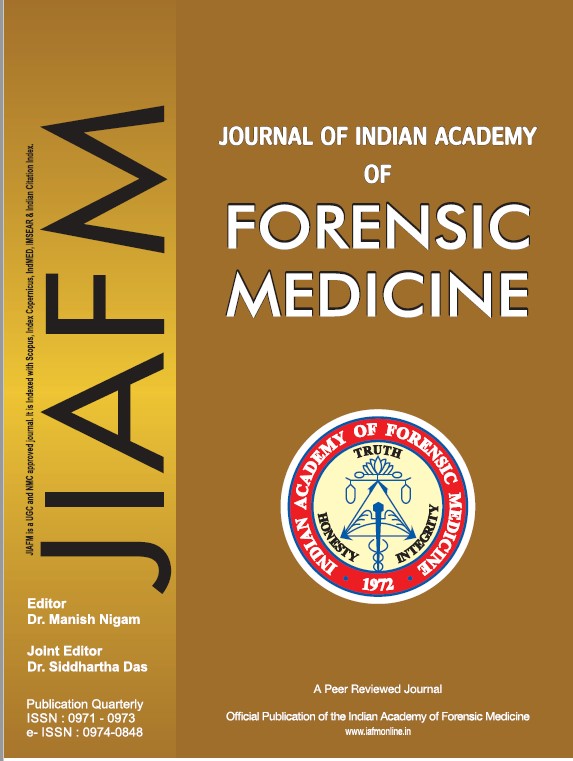Fatality following Deliberate Ingestion of a Chemical Hardener: Two Case Reports of Methyl Ethyl Ketone Peroxide Poisoning
DOI:
https://doi.org/10.48165/jiafm.2024.46.1(Suppl).18Keywords:
Chemical hardener, Methyl ethyl ketone peroxidase, Corrosive, PoisoningAbstract
Industrial chemicals and solvents are usually highly toxic and often corrosive. In India, intentional poisoning by industrial chemicals is relatively uncommon. Methyl ethyl ketone peroxide (MEKP), an organic peroxide, is used as a chemical hardener in industries to cross-link polymers. We report two cases of intentional ingestion of this chemical hardener who presented to the Emergency with complaints of severe abdominal pain and multiple episodes of hematemesis. Despite treatment, they succumbed to death within twelve hours and seven days of ingestion, respectively. On autopsy and histopathology, corrosive features were seen in the esophagus and stomach. The pathophysiology is due to the free radicals derived from MEKP causing lipid peroxidation and cell death. Though the MEKP was not detected in the viscera during the chemical analysis, the evidence from the crime scene investigation and other collaborative sources strongly suggests that the poisoning is due to MEKP. This case emphasizes the significance of clinical presentation, autopsy findings, histopathological features, crime scene investigation, and utilizing appropriate preservatives for chemical analysis in uncommon cases like MEKP poisoning. MEKP ingestions are relatively rare in the literature, with only about thirty reported cases associated with increased mortality and morbidity. These cases highlight the role of crime scene visits and emphasize the clinical, post-mortem findings and histo-pathological features in an uncommon case of MEKP poisoning. In these cases, the workplace being the source of acquiring MEKP, provisions for safe storage and keeping container count prohibit misapplication.
Downloads
References
Chang JO, Choi JW, Hwang Y. A case of severe corrosive esophagitis, gastritis, and liver necrosis caused by ingestion of methyl ethyl ketone peroxide. Clin Exp Emerg Med. 2016;3(4):256-61.
Mittleman RE, Romig LA, Gressmann E. Suicide by ingestion of methyl ethyl ketone peroxide. J Forensic Sci. 1986; 31(1):312–320.
Subbalaxmi MV, Abkari S, Srinivasan VR, Krishnaprasad A. Methyl ethyl ketone peroxide ingestion: a rare cause of corrosive chemical poisoning. Natl Med J India. 2010; 23: 150-151.
Karhunen PJ, Ojanperä I, Lalu K, Vuori E. Peripheral zonal hepatic necrosis causes by accidental ingestion of methyl ethyl ketone peroxide. Hum and Exp Toxicol. 1990; 9:197–200.
Van Enckevort C, Touw D, Vleming L-J. N-acetylcysteine and hemodialysis treatment of a severe case of methyl ethyl ketone peroxide intoxication. Clin Toxicol. 2008;46(1):74–8
Sun C, Jian T, Li Y, et al. A rare form of intoxication: acute methyl ethyl ketone peroxide poisoning. J Int Med Res. 2022;50(1):3000605211067694.
Bates N, Driver CP, Bianchi A. Methyl ethyl ketone peroxide ingestion: toxicity and outcome in a 6-year-old child. Pediatrics. 2001;108(2):473-6.
Zeiger E. NTP technical report on the toxicity studies of Methyl Ethyl Ketone Peroxide (CAS No. 1338-23-4) in Dimethyl Phthalate (CAS No. 131-11-3) (45:55) Administered Topically in F344/N Rats and B6C3F1 Mice. Toxic Rep Ser. 1993;18:(1)-C10.
Liyanage IK, Navinan MR, Pathirana ACA, Herath HRI, Yudhishdran J, Fernandopulle N et al. A case of methyl ethyl ketone peroxide poisoning and a review of complications and their management. J Occup Med Toxicol. 2015; 10:26.
Bozdemir MN, Yildiz M, Seyhanlı ES, Gurbuz S, Kilicaslan I, Karlidag T. Narrowing of airway caused by ingestion of methyl ethyl ketone peroxide. Hum Exp Toxicol. 2011; 30:2002–06.


